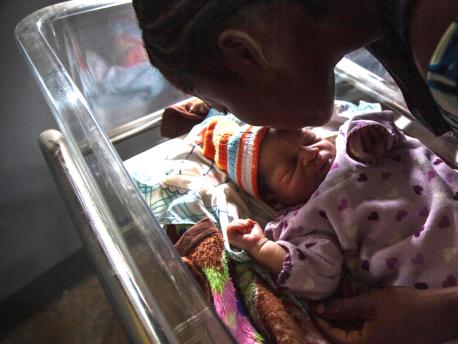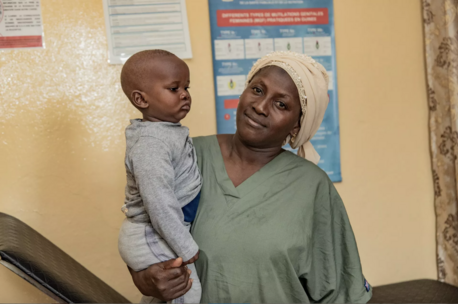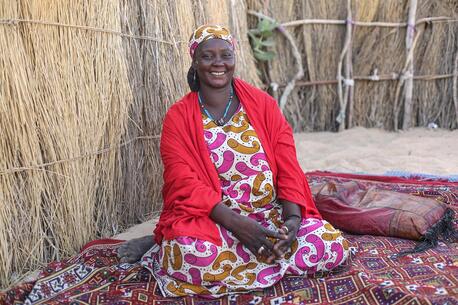
The Democratic Republic of the Congo Eliminates MNT
Babies in the DRC are no longer at risk of contracting tetanus, thanks to immunization and education campaigns by UNICEF and partners.
UNICEF and partners are working tirelessly all over the world to save and protect children.
The Democratic Republic of the Congo (DRC) has officially become the 47th country since 1999 to eliminate maternal and neonatal tetanus (MNT). This milestone was achieved despite ongoing insecurity and conflict in the DRC, including attacks on health workers battling Ebola and measles outbreaks.
The announcement by the World Health Organization leaves just 12 countries around the world still facing the threat of MNT, an excruciating and almost always fatal disease that overwhelmingly affects mothers and newborns, usually through unhygienic childbirth and umbilical cord care practices.

In November 2018, health worker Lsiri Lowoso vaccinates 3-month-old Zoe against measles, rubella, tetanus and polio as his mom, Arellete Ytshika, holds him at the Centre de Sante le Rocher Maternity Hospital in Lubumbashi, DRC. © UNICEF/UN0328788
Tetanus is acquired by exposure to the spores of the bacterium Clostridium tetani, commonly found in dirt. Mothers who give birth outside of hygienic health facilities and who have not received the benefits of immunization are most at risk. Infants infected during or just after delivery suffer an agonizing death.
A series of 3 shots provides immunity for a woman and her future children
The World Health Organization (WHO) estimates that 30,848 newborns died from neonatal tetanus worldwide in 2017, the last year for which data is available. Mothers and infants die in excruciating pain within days of delivery, but this infectious disease is surprisingly easy to prevent through immunization and hygienic birth practices. A series of three shots provides immunity to a woman, who automatically passes on that immunity to her future children.

Preparing to vaccinate a pregnant woman in Mukanga-Moke Village, Katanga Province, DRC in 2011, nurse Emmanuel Kalwazi fills a syringe with tetanus toxoid vaccine provided by UNICEF. © UNICEF/UNI106773/Asselin
The World Health Assembly first called for the elimination of neonatal tetanus in 1989, and in 1999 expanded the goal to include the elimination of maternal tetanus. At the time, the DRC was one of 59 countries where women and babies were at risk of contracting the disease.
Today, only 12 countries remain at risk
In 2010, the fight against MNT took a leap forward when UNICEF joined forces with Kiwanis International to launch The Eliminate Project. This campaign aims to raise $110 million to help educate and vaccinate millions of women of reproductive age, protecting them and their future newborns against the debilitating and fatal disease of MNT. The Eliminate Project continues to help increase equitable access to lifesaving immunizations for some of the most vulnerable mothers and children in the world.

Nurses prepare for the day's vaccination drive at a UNICEF-supported health center in Nyunzu in eastern DRC in 2014. © UNICEF/UNI158371/Dolan
Today, 47 countries have eliminated MNT, leaving just 12 at risk: Afghanistan, Angola, the Central African Republic (CAR), Guinea, Mali, Nigeria, Pakistan, Papua New Guinea, Somalia, Sudan, South Sudan and Yemen.

Nurse Rachel Munilis, responsible for prenatal consultations at Bakita Health Center in Lumumbashi, DRC, talks to pregnant women wating for tetanus vaccinations in July 2010.© UNICEF/UNI111185/Conn
MNT still threatens the lives of millions of women and their newborn babies across the globe, especially the poorest and most underprivileged populations in the hardest to reach areas. Transporting vaccines to these areas is a challenge but with support from UNICEF and partners, the Global MNT Elimination Initiative is making inroads in these remote locations.

A happy, healthy baby waits for a check-up at a UNICEF-supported health center in the Democratic Republic of the Congo (DRC) in July 2019. © UNICEF/UN0328798/Pudlowski
Elimination is achieved when there is less than one case of neonatal tetanus per 1,000 live births in a year, in every district of a country. The DRC's remarkable public health milestone could not have been reached without the dedicated support of partners such as Kiwanis International, Latter-day Saint Charities, BD, Physician Moms Group and others.
UNICEF and partners like Kiwanis International and Latter-day Saint Charities are fighting to eliminate MNT worldwide
UNICEF and partners like Kiwanis International and Latter-day Saint Charities will continue to meet the health and vaccination needs of mothers and children around the world so that no child dies a needless, preventable death.
Please support UNICEF's immunization efforts.
The Global MNT Elimination Initiative is an international private-public partnership that includes National Governments, UNICEF, WHO, UNFPA, GAVI, USAID/Immunization Basics, CDC, UNICEF National Committees, the Government of Canada, the Government of Japan, Save the Children, PATH, RMHC, the Bill & Melinda Gates Foundation, Kiwanis International, Pampers, a brand by Procter & Gamble, BD and Latter-day Saint Charities.
Top photo: Akosusu Siska kisses her new baby, Reagen, born the day before this photo was taken in November 2018 at the UNICEF-supported Jules Chevalier Clinic in Mbandaka, Équateur Province, Democratic Republic of the Congo. © UNICEF/UN0328794/Naftalin
HOW TO HELP
There are many ways to make a difference
War, famine, poverty, natural disasters — threats to the world's children keep coming. But UNICEF won't stop working to keep children healthy and safe.
UNICEF works in over 190 countries and territories — more places than any other children's organization. UNICEF has the world's largest humanitarian warehouse and, when disaster strikes, can get supplies almost anywhere within 72 hours. Constantly innovating, always advocating for a better world for children, UNICEF works to ensure that every child can grow up healthy, educated, protected and respected.
Would you like to help give all children the opportunity to reach their full potential? There are many ways to get involved.





